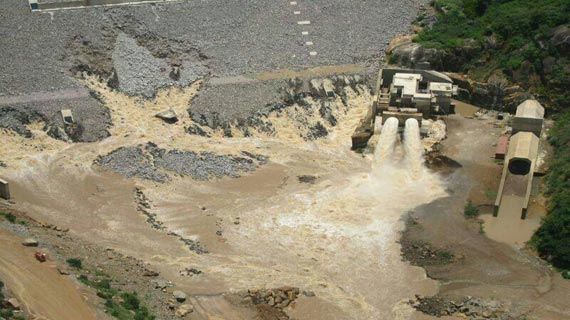
SMALL dilapidated houses, collapsing roofs that straddle for kilometres along the Ngundu-Triangle Road as well as vandalised irrigation equipment are all that remain of controversial business magnate Billy Rautenbach’s dream of setting up an ethanol plant in Masvingo.
TATENDA CHITAGU OWN CORRESPONDENT
The houses were built from expensive bricks but now lie derelict and neglected, yet this was meant to be the country’s first ethanol project before the one at Chisumbanje was built.
The houses were built in 2008 to cater for people Rautenbach, through his company Zimbabwe Bio-Energy (ZBE), wanted to move off land earmarked for the ethanol plant in the vast Nuanetsi Ranch in Mwenezi.
He also installed state-of-the-art irrigation equipment for one-hectare plots where displaced villagers were to be resettled on and set up offices as well as a workshop at the site.
Just opposite the houses, excavation at a hill lies abandoned and quarry stones lie in heaps with grass outgrowing the poles meant for construction of the offices and houses.
Six years down the line, the project remains still-born largely due to political bickering and factionalism triggered by succession politics in the ruling Zanu PF.
A senior ZBE employee told Southern Eye that they could have set up an ethanol plant in Mwenezi before moving to Chisumbanje.
- Chamisa under fire over US$120K donation
- Mavhunga puts DeMbare into Chibuku quarterfinals
- Pension funds bet on Cabora Bassa oilfields
- Councils defy govt fire tender directive
Keep Reading
“The resources that were meant for this ethanol plant were rechannelled to the Chisumbanje plant after spanners were thrown in the plans to set up herey,” the employee said on condition of anonymity due to ZBE protocol.
It is believed that the then Zanu PF Masvingo provincial leadership, including the provincial governor at that time Willard Chiwewe, was sympathetic to Vice-President Joice Mujuru and they deliberately frustrated the setting up of the multi-million dollar project as they viewed Rautenbach as being linked to Justice minister Emmerson Mnangagwa.
Mujuru and Mnangagwa are alleged to be leading factions that seek to succeed President Robert Mugabe for the leadership of the ruling Zanu PF and the country.
They have reportedly been engaged in a fierce but subtle battle to strategically position themselves for an eventual takeover of the coveted presidency.
The two, however, deny leading any factions and have dismissed the allegations as a creation of the media.
Sources said Rautenbach was blocked for allegedly being aligned to the “wrong camp”.
“Factionalism took centre stage as the project could have financially made another faction stronger, so they ensured that nothing materialised. That is why you see those houses that were just left idle,” the source said.
Another source said due to frustration, Rautenbach then moved to Chisumbanje where he set up the existing ethanol that has also been blighted by political problems.
ZBE public relations officer Lilian Muungani did not respond to a Southern Eye inquiry on what stalled initial plans to set up the ethanol plant in Mwenezi.
But the Development Trust of Zimbabwe, which had partnered with ZBE in the project, admitted that political squabbling scuttled plans to set up a plant in the area.
“Lack of unity within the political leadership structures manifested itself when some of the political leaders within Masvingo took the position that the project cannot go ahead because the whole of Nuanetsi Ranch is targeted for the resettlement of people from Tokwe-Mukosi (Dam),” wrote Charles Madonko, the DTZ Nuanetsi resident director in an e-mailed response to questions from our sister paper the Zimbabwe Independent on Friday.
“DTZ had offered, through Agriculture minister Joseph Made, that the need to resettle people could be achieved by designing the programme around the canal route to be constructed when drawing water from Tokwe-Mukosi.
“At the technical levels, both the investment and resettlement of people could be achieved.
“However, effectively this matter became a subject of bickering among leaders and there was no concerted effort to address the technical issues of water and the illegal settlers so as to instil investor confidence.
“These factors combined to effectively undermine investor confidence. The investment blueprint was very relevant to the needs of our people, but the supervisory political environment was not,” Madonko said.
Now, efforts to revive the ethanol project, which according to the company, would create more than 5 000 jobs and create 2 000 out-growers who would supply sugarcane to the ethanol plant, again seem unlikely due to continued political bickering and the resettlement of 18 000 Tokwe-Mukosi Dam flood victims at the ranch in February.
The flood survivors occupied a portion of the ranch where infrastructure for the project was supposed to be built.
Asked what was stalling the plant now that water would be available in abundance from the country’s largest inland water reservoir upon completion, Masvingo Provincial Affairs minister Kudakwashe Bhasikiti pleaded ignorance on the project.
“I do not know about the project. Go and ask the people who told you,” Bhasikiti said by phone.
Bhasikiti is Mwenezi East MP.










